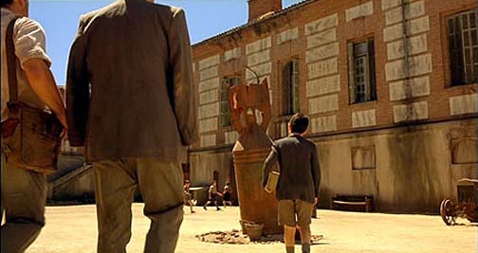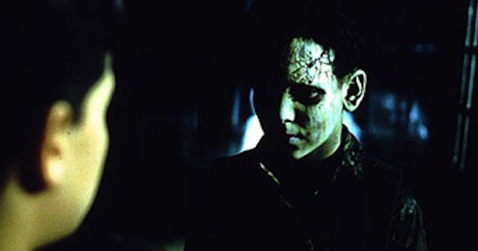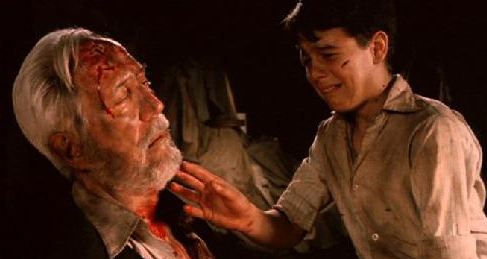|
|
Reviewed by Glenn Erickson
Criterion tempts the powers of darkness with this disc release -- the spine number for their The Devil's Backbone (El espinazo del Diablo) Blu-ray and DVD is "666." I may have seen a faint reflection in my video monitor of a scaly, smoking claw reaching for me as I watched, or then again maybe I didn't.
The effect is almost the same, for Guillermo del Toro's The Devil's Backbone is a creepy spook show in the tradition of The Haunting and The Uninvited (both promised in HD for this Hallowe'en). Knowing that audiences no longer need to be told what a ghost is, the screenplay skips explanations - we experience the hauntings from a little boy's point of view. In contrast to his Mexican thriller Cronos, Backbone was produced by Pedro Almodóvar in Spain. A companion picture to the better-known Pan's Labyrinth, The Devil's Backbone might have done just as well had it not made its North American premiere just as 9/11 occurred. Audiences had no desire for an evening of unsettling scares, set amid acts of murder and retribution in a tragic civil war.
Yet the film cemented Guillermo del Toro's reputation as a master fantasy filmmaker. The then-hot J-Horror trend of Japanese ghost stories may have been more frightening, but the historical context of del Toro's scare pictures give them more emotional depth. The evil legacy of the Spanish Civil War is very much like a haunting.

The story is about a search for justice in the last days of the Spanish Civil War, when both are in short supply. Scattered Loyalists are on the run. Carlos (Fernando Tielve), the son of a fallen Republican, is dropped off at an isolated orphanage run by the nervous, one-legged Carmen (Marisa Paredes) and the elderly Professor Casares (Federico Luppi). They do what they can to ease the new boy's fears. Carlos is received with hostility by some of the other orphans. While examining a large, defused (but still ticking) bomb left sticking upright in the middle of the courtyard, Carlos sees the first of a series of unmistakable phantom appearances by Santi (Junio Valverde), a boy thought to have run away. Carlos soon associates a mysterious water cistern in the school basement with Santi, who claims he was murdered. While creeping around the orphanage at night Carlos observes the school handyman Jacinto (Eduardo Noriega) trying to break into a safe. Carmen and Professor Casares are at a loss as to what to do -- the orphanage was set up to care for the children of fallen Loyalists, and Franco's troops may arrive at any time to murder them all. Carmen's safe holds a fortune in Republican gold, that mustn't fall into the hands of the rebels. Jacinto, however, doesn't care who dies -- he wants that gold. Still haunted at every turn, Carlos eventually finds the nerve to speak to the ghost of Santi, who gives him a grave warning: "many will die."
The Devil's Backbone overcomes its main obstacle with ease. Thanks to del Toro's knowing direction and unexpectedly vivid images, we very quickly accept the spectral Santi as a phantom to be reckoned with. Despite appearing early and often Santi remains an unsettling presence at all times. Never clearly seen, he's associated with sickly amber liquids -- the slimy underground pool, the Professor's pickling liquor, the creepy amber in the drowning scenes. His shiny, slick face has the appearance of cracked porcelain, with a "Baby Jane"-like hole in his upper temple. Del Toro manages to misdirect our attention to make some of Santi's entrances a jolting surprise. As I'm not the least bit superstitious, most ghost movies try my patience. With a good story to tell and a purpose beyond his scare moments, Guillermo del Toro steps neatly around my reservations.

Helplessness, dread, grief, injustice ... in The Devil's Backbone ghosts and politics are a perfect fit. The orphans fear that one of their own murdered Santi, and are afraid to discuss the problem. Carmen and the Professor are as unaware of the Santi scare as they are of Jacinto's treachery. They're also victims of their own affections. Professor Casares indulges a hopeless love for his employer, while Carmen can't resist Jacinto's visits to her bedroom -- where he 'borrows' keys to try on her safe. The Professor gets a taste of the apocalypse to come when he inadvertently witnesses the execution of a score of captured Republicans, including men he knows personally.
As in Pan's Labyrinth, which del Toro describes as a similar story from a little girl's POV instead of a little boy, the beauty of this picture is the way historical tragedy ties into the fantastic elements. Jacinto's theft of the keys, a few at a time, is like something out of a classic Spanish novel. The bomb standing like a statue in the courtyard is a gross symbol of the now not-too-distant warfare. It ticks as a reminder that danger is coming, and that it's time to move on. How does a woman with a wooden leg evacuate a dozen boys, when there's nowhere to go? Del Toro makes not a single misstep in the eerie scenes with the vengeful ghost. Will Carlos want vengeance when he finds out what happened to his own father? Who will carry on for Spain if the only survivors have no idea what the fight was about?
The satisfying final act of The Devil's Backbone complicates things further. Professor Casares serves as a sort of "Mrs. Cooper" figure, sitting guarding his boys with a shotgun across his lap, as did Lillian Gish in Charles Laughton's Night of the Hunter. Jacinto's coarsening attitude toward the woman who saved him and the boys he's supposed to be protecting, becomes a vivid expression of budding Fascism. Considering how Jacinto's sexual identity figures into his antisocial crimes, it's a perfect expression.

I must confess that for a number of years I foolishly confused The Devil's Backbone with another Spanish movie I'd heard about, that reportedly deals with a small boy tortured by a fiendish adult. What a mistake! Del Toro's film is fit for any audience, and carries much the same 'sting' as does Pan's Labyrinth without the elaborate fairy tale trappings. The irony is not just that the living characters are the real fiends. With so much political treachery afoot, the spirit world of humans must be seething with un-avenged outrages.
Criterion's demonic Spine 666 Blu-ray of The Devil's Backbone didn't turn to dust at midnight, and no fiend from hell arrived to claim my soul. So be assured that it's a beautifully transferred and timed encoding of Guillermo del Toro's great show. The many tricky images that come off well -- subtle lighting and special effects at night and in the strange orphanage basement with its vile-looking water tank crawling with oversized slugs. The 5.1 surround track is equally alive with Gothic creaks, drips and echoes in the orphanage halls. No travelogue gypsy music here -- Professor Casares' old Victrola plays ballads, not classical music.
Criterion producer Curtis Tsui has a good record with horror fantasy material. That and the enthusiastic participation of director del Toro guarantees as many interesting extras as were included with the Collection's previous Cronos disc. The director is articulate and personable in his commentary, a movie introduction and an older interview. He provides a wealth of gallery material, including his original shot sketches. These are compared to the official storyboards and final scenes in one extra. A making-of docu from 2004 is included, as is the film's trailer. Especially welcome is a featurette examining the film's references and fictional relationship to the real Spanish Civil War, as outlined by scholar Sebastian Faber. An insert flyer contains an essay by critic Mark Kermode, "The Past is Never Dead."
On a scale of Excellent, Good, Fair, and Poor,
The Devil's Backbone Blu-ray rates:
Movie: Excellent
Video: Excellent
Sound: Excellent
Supplements: Making of docu, del Toro introduction and audio commentary; other interviews, director's notebook, featurette about the Spanish Civil War, sketches, storyboards and final film comparison, trailer, insert booklet essay by Mark Kermode.
Deaf and Hearing Impaired Friendly?
YES; Subtitles: English
Packaging: Keep case
Reviewed: August 25, 2013

DVD Savant Text © Copyright 2013 Glenn Erickson
See more exclusive reviews on the Savant Main Page.
Reviews on the Savant main site have additional credits information and are often updated and annotated with reader input and graphics.
Also, don't forget the
2011 Savant Wish List.
T'was Ever Thus.
Return to Top of Page
|

